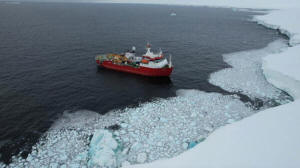|
The Laura Bassi vessel reached a point with the coordinates of
78° 44.280 S in the Bay of Whales in the Ross Sea, according to
Italy's National Institute of Oceanography and Applied
Geophysics.
The voyage was made possible by an unusual lack of ice in the
area, it said. Satellite analysis last year showed that
Antarctica's coastal glaciers are shedding icebergs more rapidly
than nature can replenish.
"I am happy with setting a record, but at the same time I am sad
to see that things are really changing here in Antarctica and in
the world in general," Franco Sedmak, the ship's captain, told
Italy's ANSA news agency.
A previous voyage with a different vessel to the same area in
2017 came up against impenetrable ice, he said.
"I never thought that I would find such a melting of the ice
after a few years to be able to go as far south as we managed
this year, helped by pushing and being a bit daring."
Researchers from the Laura Bassi took samples to study fish in
the waters and explored to a depth of 216 metres to help get a
better understanding of the sea currents.
An initial analysis showed the water remained extremely cold and
a high density of larval and juvenile stages of fish species,
with some varieties rarely observed in the Ross Sea, and a large
amount of unicellular algae.
(Writing by Keith Weir; Editing by Arun Koyyur)
[© 2023 Thomson Reuters. All rights
reserved.] Copyright 2022 Reuters. All rights reserved. This material may not be published,
broadcast, rewritten or redistributed.
Thompson Reuters is solely responsible for this content.

|
|




